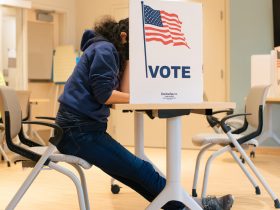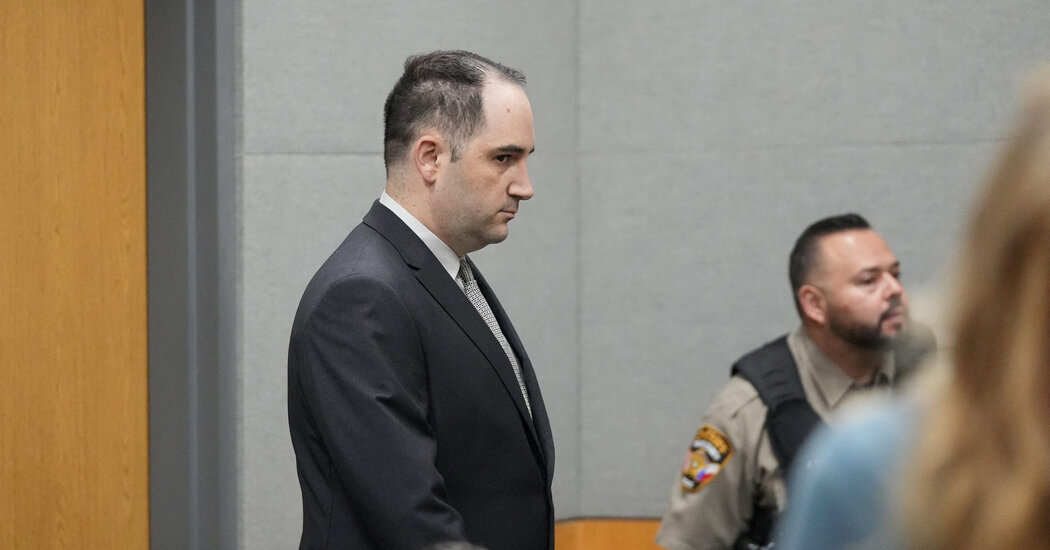HOUSTON — For 17 hours last week, jurors in a cramped court conference room in Texas deliberated over the fate of Daniel S. Perry, a U.S. Army sergeant accused of fatally shooting a protester during a Black Lives Matter demonstration in the summer of 2020.
On a screen inside the room, they reviewed video from the confrontation on the streets of Austin, the Texas capital, and discussed whether Mr. Perry had acted in self-defense against the protester, who was carrying an AK-47-style rifle. Toward the end, one juror left in tears as it became clear that she was the final holdout. After returning, she joined the others in voting to convict him of murder.
“It was just so stressful,” said Jere Dowell, an alternate juror who sat in on the deliberations and described them to The New York Times, but did not participate. “It was just a sad, sad situation for both parties,” another juror said. “I was glad that it’s over.”
But it was not.
Instead, the jury’s decision and how it was reached have become the focus of new scrutiny by defense lawyers and, at the direction of Gov. Greg Abbott, investigators from the Texas Board of Pardons and Paroles.
In the days since the verdict was announced on Friday, investigators from Mr. Perry’s defense team have contacted jurors, visiting some at home, as they seek to show that at least one of them relied improperly on information not presented during the trial. The new efforts came after the governor suggested on Saturday that the verdict was wrong, and said that he would grant Mr. Perry a pardon for the killing.
The legal and political wrangling put a glaring national spotlight on a case that already featured some of the most familiar political flash points in modern American life: the protests over George Floyd’s murder in 2020; the increasing ubiquity of military-style rifles on the streets; and the legal rights afforded to armed people who stand their ground and fire at threats rather than retreat.
The call for a pardon by Mr. Abbott, before Mr. Perry had even been sentenced, did not fit the governor’s past practice. Under pressure from conservative commentators including the Fox News host Tucker Carlson, the governor acted within hours of the verdict and said that the jury had ignored the law. “Texas has one of the strongest ‘Stand Your Ground’ laws of self-defense that cannot be nullified by a jury or a progressive District Attorney,” he wrote on Twitter.
A pardon must be formally recommended by the pardon board, whose members the governor appoints, before he can grant it. In October 2021, the board recommended a posthumous pardon for Mr. Floyd for a minor drug conviction in Houston; the governor, in response, said he would study the case. Months later, the board rescinded its recommendation.
In Mr. Perry’s case, the motion for a new trial, filed on Tuesday by his lawyers, Clint Broden and Doug O’Connell, similarly landed earlier in the process than is typical, in order to raise the issue of potential juror misconduct.
The parallel legal tracks each focused on different aspects of the jury’s decision in a case that hinged on whether Mr. Perry had the legal right to shoot Garrett Foster, 28, a former aircraft mechanic for the U.S. Air Force. The Travis County district attorney, José Garza, has asked for a chance to present evidence to the pardons board before it makes a decision, and requested that the board meet with Mr. Foster’s family. Mr. Garza was also expected to respond to the motion for a new trial.
A sentencing hearing was expected this week, but the judge in the case, Cliff Brown, has yet to set a date. Mr. Perry, who at the time of the shooting was on active duty in the Army at Fort Hood, is facing a sentence of life in prison.
The night of the shooting, on July 25, 2020, Mr. Perry was working as a driver for Uber. Mr. Foster, a frequent presence at protests against police violence in Austin, was in a demonstration, carrying his rifle on a strap in front of him. The two men encountered each other on a street not far from the Texas Capitol after Mr. Perry, according to the police, turned his car right, in the direction of the protesters. Mr. Foster, wearing a covering on part of his face, was in a crowd that surrounded the vehicle. Mr. Perry shot Mr. Foster from inside his car.
Mr. Perry’s lawyers argued that he did so in self-defense and that Mr. Foster had begun to raise his weapon before Mr. Perry opened fire. Prosecutors said Mr. Perry had driven at the protesters and shown evidence, before the shooting, of animosity toward protesters on social media. In one conversation on social media with a friend, described during the trial, Mr. Perry observed that killing protesters was legal if it was in self-defense, according to The Austin Chronicle.
As in other states, the Texas “stand your ground” law does not require someone to try to retreat first before using deadly force to defend against a threat. At the same time, force cannot be used by someone who initiated or provoked the threat, or in response to a verbal provocation alone. In a criminal case where self-defense is used as justification, the burden is on the prosecution to prove the use of force was unlawful.
The defense motion about possible jury misconduct revolves around the self-defense issue.
According to an affidavit filed with the motion for a new trial, one of the jurors reported that another juror had printed out portions of the Texas penal code and shared its contents with those in the jury room, a violation of the rules on deliberations. That juror, the affidavit said, then incorrectly interpreted the law around self-defense in discussions with other jurors. The affidavit also said that an alternate juror had improperly made noise — “snort, huff, gasp” — during deliberations.
The jury discussed the self-defense issue at length, said Ms. Dowell and the other juror who spoke to The Times. Jurors are permitted to discuss cases after they have been discharged by the judge.
At first, Ms. Dowell said, they did not take a vote to see where everyone stood. But after several hours, they did so and found themselves to be somewhat split, with a majority supporting a conviction but several not convinced. The question of self-defense was the sticking point for many.
“It was definitely considered. What it came down to was the purpose and the intent. The way the law was written, that was one of the things that the state had to prove,” said the other juror. Ultimately, the juror said, they felt that the messages on social media showed that intent.
“It was not necessarily intent that he drove from Killeen to Austin to do this,” the juror said, requesting anonymity to discuss the closed-door deliberations. “But it was the messages that gave us his state of mind and what he was thinking regarding the protest.”
Both jurors said that despite the politically charged nature of the case, the deliberations progressed without shouting or heated argument. “We never had any kind of political conversations,” Ms. Dowell said, adding that the judge had instructed them to put their biases aside. “That was said more than one time” during deliberations, she said. “The judge told us to look at the evidence.”
Ms. Dowell said that no one was pressured to reach a verdict and that the final holdout was told that “if that’s your belief, we just need to tell them it’s a hung jury.”
Prosecutors and defense lawyers met with jurors immediately following the verdict, but the additional queries over possible juror misconduct occurred after that. Ms. Dowell said she also heard from another juror who had been visited by an investigator from Mr. Perry’s defense team.
It was not clear whether anyone from the district attorney’s office had tried to contact the jurors about the misconduct allegations.
In any case, Ms. Dowell and the other juror said they did not recall anyone bringing in printed material about the criminal code or anything else. Though the jurors’ names were redacted in the defense affidavit, Ms. Dowell said she believed she was the alternate juror described in the affidavit as having made improper noise. “The judge didn’t tell me I couldn’t roll my eyes, or I couldn’t sigh,” she said.
She added that she decided to speak publicly, first by calling into a local radio show over the weekend and then by talking to The Times, because of her frustration with Mr. Abbott’s demand for a pardon.
“That was just crazy to me,” she said. “He hasn’t even been sentenced.”
It remained unclear when the judge would decide on the motion for a new trial, thought it appeared unlikely that he would set a date for sentencing before doing so.
The timeline for a pardon, which typically takes place long after a conviction and sentencing, was similarly uncertain. Officials at the pardon board did not respond to a request for comment.
















Leave a Reply